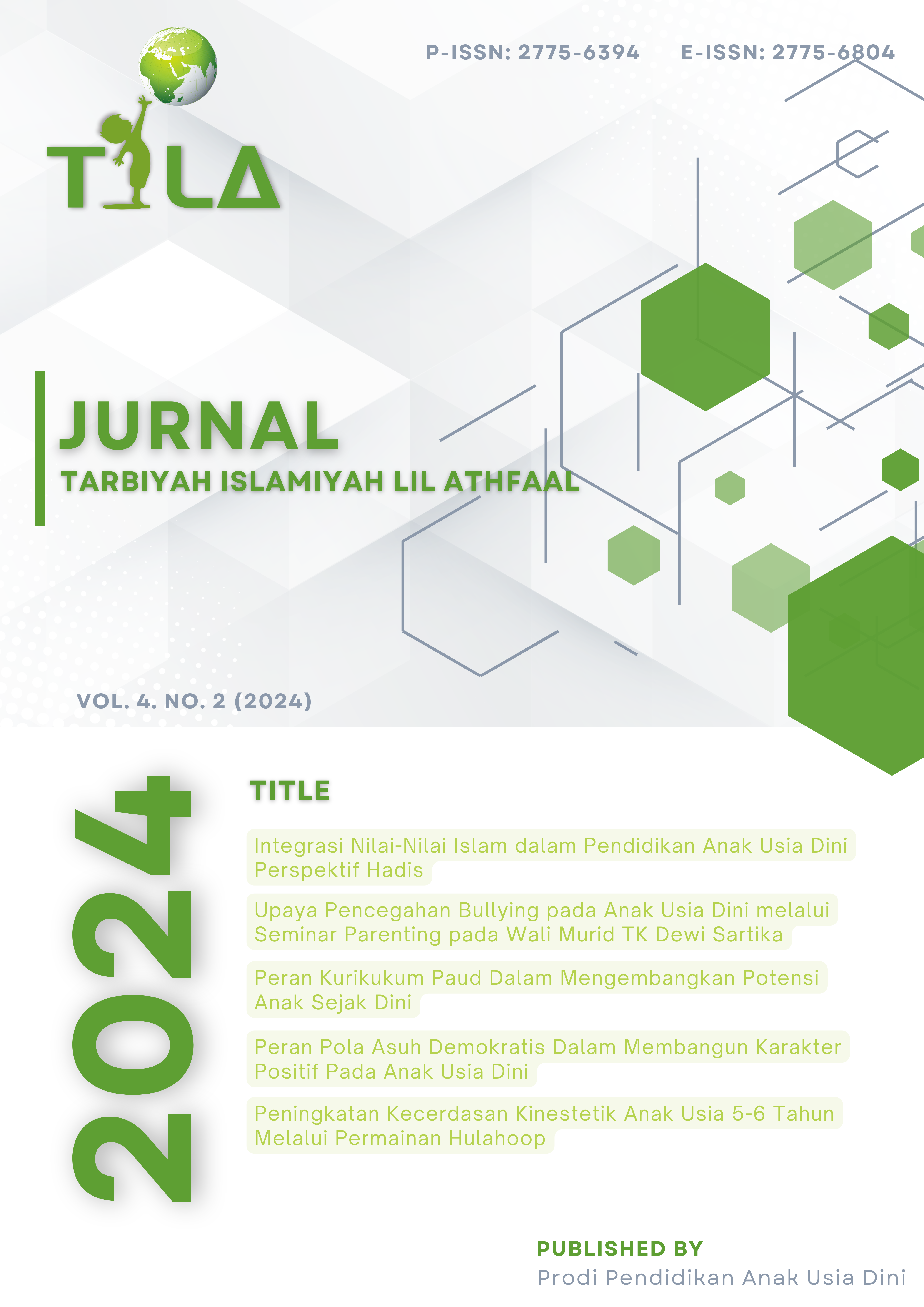Integrasi Nilai-Nilai Islam dalam Pendidikan Anak Usia Dini Perspektif Hadis Integration of Islamic Values in Early Childhood Education from the Perspective of Hadith Section Articles
##plugins.themes.academic_pro.article.main##
Abstract
Early Childhood Education (ECE) plays a vital role in shaping children's character and personality. In Islam, the integration of Islamic values into early childhood education is a strategic step to develop a generation with noble character from an early age. This article aims to analyze the approach to integrating Islamic values in early childhood education based on the perspective of hadith. The study employs a library research method with content analysis on various literatures, scholarly journal articles, and relevant research reports. The primary data are derived from hadiths focusing on children's education, such as faith values, morals, and the development of Islamic character. The findings reveal that hadith contains fundamental principles for educating children, such as fostering proper manners, compassion, and habituating acts of worship. These principles align with the concept of early childhood education, which emphasizes value-based parenting. The integration of Islamic values can be implemented through thematic and interactive approaches, such as storytelling, educational games, and experiential learning. The main challenges in implementation include limited understanding of Islamic values among teachers and the lack of relevant teaching materials. Source triangulation is used to test data validity and ensure consistency among findings from various literatures. This article concludes that integrating Islamic values in early childhood education based on hadith can establish a strong foundation for Islamic character. Teacher training and the development of value-based curricula are essential to support effective implementation in early childhood education institutions.
##plugins.themes.academic_pro.article.details##
References
- Abbas, N., & Astoko, D. B. (2024). PENDEKATAN ISLAMI DALAM PENDIDIKAN ANAK USIA DINI BERDASARKAN AJARAN NABI MUHAMMAD SAW. Al-Urwatul Wutsqo: Jurnal Ilmu Keislaman Dan Pendidikan, 5(September), 139–151.
- Abbas, N., Subando, J., & Tamami, M. Z. (2023). Pendidikan Keteladanan Shalahuddin Al-Ayyubi Konteks Pendidikan Islam Era Society 5.0. Jurnal Ilmu Pendidikan Dan Sains Islam Interdisipliner, 2(2), 117–128. https://doi.org/10.59944/jipsi.v2i2.98
- Arifudin, O. (2019). Konsep Paud.
- Chasanah, U. (2018). Urgensi Pendidikan Hadis dalam Pembentukan Karakter Anak Usia Dini. Jurnal Living Hadis, 2(1), 83. https://doi.org/10.14421/livinghadis.2017.1357
- Fathurohim. (2023). KURIKULUM MERDEKA DALAM PERSPEKTIF FILSAFAT PENDIDIKAN ISLAM. Jurnal Asy-Syukriyyah, 24(2), 184–194.
- Frimayanti, A. I. (2017). Implementasi Pendidikan Nilai Dalam Pendidikan Agama Islam [Implementation of Values Education in Islamic Religious Education]. Al-Tadzkiyyah: Jurnal Pendidikan Islam, 8(2), Hal. 240.
- Home, H. S. (n.d.). Setup HaditsSoft.
- Kadir, A., & Asrohah, H. (2014). Pembelajaran Tematik. In RajaGrafindo Persada (Ed. 1). PT. Raja Grafindo Persada.
- Ngiu, Z., Djafri, N., & Arwildayanto, A. (2021). Strategi Guru dalam Pembelajaran Holistik pada Pendidikan Anak Usia Dini. Jurnal Obsesi : Jurnal Pendidikan Anak Usia Dini, 6(3), 1429–1438. https://doi.org/10.31004/obsesi.v6i3.1798
- Ridhawati, S., Ayu azzahra, S., & Amrillah, R. (2024). Hubungan Pendidikan Anak Usia Dini (PAUD) dengan Konsep Pendidikan dalam Islam: Menoreka Pemikiran Syech Muhammad Naquib al-Attas. Jurnal Pendidikan Anak Usia Dini, 1(4), 8. https://doi.org/10.47134/paud.v1i4.683
- Rukin. (2021). Metodologi Penelitian Kualitatif Edisi Revisi. CV. Jakad Media Publishing.
- Saputra, M., & dkk. (2021). Pengembangan Kurikulum Pendidikan Agama Islam (Rusnawati (ed.)). Yayasan Penerbit Muhammad Zaini.
- Suharsimi Arikunto. (2002). Prosedur Penelitian Suatu Pendekatan Praktek. PT. Rineka Cipta.
- Supriadi, Pasiska, & Helandri, J. (2023). Manajemen Pengelolaan Pendidikan Islam Anak Usia Dini (PIAUD) Berbasis Al-Quran. Bouseik: Jurnal Pendidikan Islam Anak Usia Dini, 1(1), 57–76. https://doi.org/10.37092/bouseik.v1i1.549
- Syahrizal. (2024). Integrasi Nilai-Nilai Al- Qur’an Dan Hadits Dalam Kurikulum Merdeka Pada Lembaga Pendidikan Islam. Jurnal Review Pendidikan Dan Pengajaran, 7(4), 15535–15542.
- Wibowo, Y. R., & Hidayat, N. (2022). Al-Qur’an & Hadits Sebagai Pedoman PendidikanKarakter. Bidayah: Studi Ilmu-Ilmu Keislaman., 13(8), 113–131.
- Yus, A. (2011). Model Pendidikan Anak Usia Dini. PT. Adhitya Andrebina Agung.

